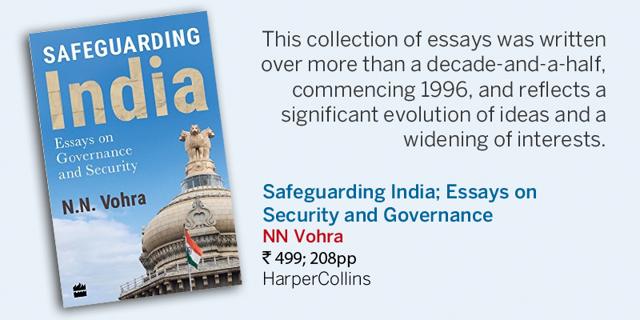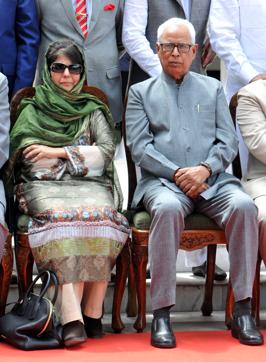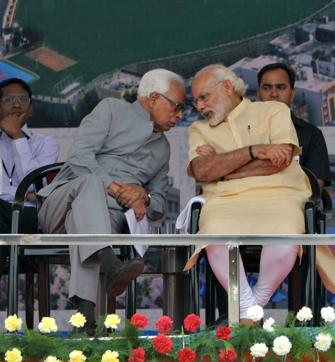Book review: Safeguarding India offers provocative explorations
Safeguarding India by NN Vohra, Governor of Jammu & Kashmir, is magisterial in its sweep but fails to effectively address the question of collective malfeasance, collusion and intentional neglect by the institutions that are intended to protect national interest
NN Vohra has had an extraordinarily distinguished career in administration and continues in his capacity as Governor of Jammu & Kashmir to deal with acute problems of governance in one of the most troubled regions of the country. His writings, particularly on a subject as urgent as Safeguarding India, excite a natural interest. Of course, those who are looking for a kiss-and-tell memoir – or even fragments thereof – will be sorely disappointed. For others, looking for more serious fare, the book raises crucial questions and a range of provocative explorations into what needs to and can be done to resolve the growing crises in governance in a diverse, often fractious, country of “over a billion and a quarter”, comprising “4,635 multi-religious communities, which speak 179 languages and nearly 550 dialects.”

Safeguarding India is a collection of essays written over more than a decade and a half, commencing 1996. Unsurprisingly, it reflects a significant evolution of ideas and a widening of interests, reflecting changing circumstances, and moderated by the experience of intervening years. This is starkly the case in Vohra’s overarching approach to the mounting challenges of security that confront India. In the early essay, “Is India Under Threat?” he advocates sweeping changes in the constitutional order and administrative architecture, arguing that “National security can no longer be safeguarded by seeking refuge in the existing constitutional arrangements and division of responsibilities between the Centre and the states...” Towards the end of the book, however, he concludes, “much time and energy may be wasted if we embark upon any approach which assumes that mere structural changes in the administrative apparatus will result in improving the governance of this vast country of ours. We have spent the past several decades in negating the Constitution, abrogating the rule of law and systematically subverting the application of well-laid-down rules of government business and systems of functioning... Let us spend the next few years in honestly and assiduously restoring the essentials of governance.”

Nevertheless, Vohra does support a significant redistribution of responsibilities between the Centre and the States, with the former taking up increasing tasks to meet challenges that no longer respect state or international boundaries. In this, while suggesting a ‘joint approach’, he does demonstrate a centrist bias, perhaps rooted in his long years of service at Raisina Hill. He documents in some detail the failure of the State to effectively handle internal security challenges, and even their failure to “discharge their vital obligation to maintain well-trained, fully equipped and professionally trustworthy civil and armed police forces.” Here, he appears to contrast a realistic appraisal of the failure of the States with a somewhat ideal picture of the Centre. In fact, central institutions are in far from the best of health and, indeed, at least some States have an administrative record – including internal security management – that would compare quite favourably with the performance of many of the Centre’s institutions, including its security and intelligence apparatus, and despite the Centre’s often disproportionate access to resources. Crucially, cooperation and control are functions of capacity. No State has ever rejected assistance from the Centre, or even from other States, where it is effective, and not a mala fide attempt to usurp powers in perpetuity. The rejection of central intervention by the States is often rightly rooted in the Centre’s own infirmity and ineptitude.

But Vohra displays little sympathy for either Centre or State when he addresses the issue of corruption, the collapsing “rusted steel frame” of administration, and the progressive criminalization of politics. This is home ground, as he was the principal author of the celebrated Vohra Committee report that excoriated the criminal-bureaucrat-political nexus that has undermined national security. Significantly, a redacted version of the report is appended to the book.
Vohra emphasises the crisis of capacities in the state police forces as the source of the rising lawlessness and disorders across the country, and is rightly sceptical about the potential for the transformation of the state police “merely by enacting a new Police Act, protecting the topmost police officers by granting them mandatory tenures and expecting that the political executive in the states will overnight give up their unwholesome interests as soon as the state security commission is set up.” These have been the measures overwhelmingly emphasised by advocates of police reform, and were the principal concern of the Supreme Court order of 2006, in Prakash Singh vs. Union of India. Much of the official discourse on national security and policing has been diversionary and has evaded the crucial issues of capacities and capabilities.

Safeguarding India is, of course, itself evasive on a range of issues. This is particularly the case with chapters on matters relating to civil-military relations, national defence and bureaucratic reform. Indeed, addressing the last of these, Vohra resorts to cliché, suggesting that a ‘depoliticization of Civil Services’ would help ensure a ‘better tomorrow’. Obviously easier said than done. Indeed, Vohra fails entirely to effectively address the question of collective malfeasance, collusion and intentional neglect by the very powers and institutions that are intended to protect the national interest.
Read more: Mark Tully on NN Vohra’s book - When reforms don’t have the power to reform
The sheer sweep of subjects Safeguarding India examines is magisterial, and will interest anyone concerned by the recurrent crises that appear to surround us. Deficiencies of treatment are understandable in view of Vohra’s continuing association with successive Governments and official duties. This is certainly not Vohra’s final word on the subject. That will have to wait till he is freer to speak his mind.
Ajai Sahni is Executive Director, Institute for Conflict Management





